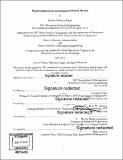Replenishment in an integrated stock world
Author(s)
Martinez Puppo, Manuel.
Download1119387254-MIT.pdf (4.897Mb)
Other Contributors
Sloan School of Management.
Massachusetts Institute of Technology. Department of Mechanical Engineering.
Leaders for Global Operations Program.
Advisor
Georgia Perakis and Brian Anthony.
Terms of use
Metadata
Show full item recordAbstract
As part of Zara's omnichannel strategy, stock integration between online and offline channels has become a major focus of its operations. Within this context, Zara aims to achieve a channel agnostic stock offering to maximize value across channels. This thesis focuses on the algorithmic design of an integrated system to make replenishment decisions across channels, namely, understanding the value of using online demand to replenish traditional stores to reduce operational costs and improve customer experience. The proposed solution is an optimization-based heuristic that calculates the target stock through the base stock inventory model. Low-online-forecast items are allocated to e-commerce warehouses to ensure the equal risk of local stockouts. High-online-forecast items are allocated across both stores and e-commerce warehouses, trading off the expected value from getting closer to the customer, and the risks and extra costs of inventory decentralization. High-online-forecast items allocation consists of a two-step procedure. First, the effective operational capacity of each location is estimated through simulation. The effective operational capacity is the maximum number of units that can be fulfilled from a location minus the expected number of units fulfilled with in-store excess stock. Second, the optimal allocation of the online base stock to locations is obtained through a stochastic linear program. The heuristic was compared in a small-scale scenario with the clairvoyant full formulation of the problem. The heuristic underperformed the full formulation by 10.3%. In a realistic scale scenario, the heuristic outperformed the single channel approach by 3.5%. Furthermore, a 4.5% improvement was obtained through a 5x increase in the online order preparation capacity. Such a capacity expansion is not only inexpensive but highly encouraged to extract the maximum value from the heuristic.
Description
Thesis: M.B.A., Massachusetts Institute of Technology, Sloan School of Management, 2019, In conjunction with the Leaders for Global Operations Program at MIT Thesis: S.M., Massachusetts Institute of Technology, Department of Mechanical Engineering, 2019, In conjunction with the Leaders for Global Operations Program at MIT Cataloged from PDF version of thesis. Includes bibliographical references (pages 61-62).
Date issued
20192019
Department
Sloan School of Management; Massachusetts Institute of Technology. Department of Mechanical Engineering; Leaders for Global Operations ProgramPublisher
Massachusetts Institute of Technology
Keywords
Sloan School of Management., Mechanical Engineering., Leaders for Global Operations Program.